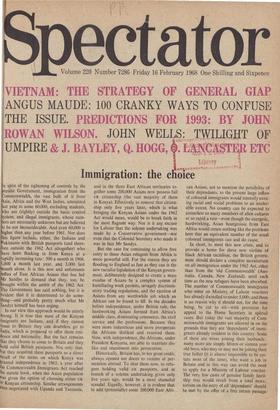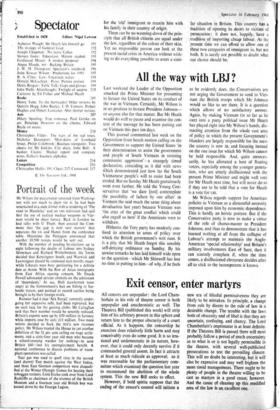Immigration: the choice
In spite of the tightening of controls by the resent Government, immigration from the ommonwealth, the vast bulk of it from sia, Africa and the West Indies, amounted last year to some 60,000, excluding students. Who are (rightly) outside the basic control system, and illegal immigrants, whose num- bers are necessarily unknown but are believed to be not inconsiderable. And even 60,000 is higher than any year before 1961. Nor does this figure include, either, the Indians and Pakistanis with British passports (and there- fore outside the 1962 Act altogether) who have been flocking in from Kenya at a rapidly increasing rate : 500 a month in 1966, 1,000 a month last year, and 3,000 last Month alone. It is this new and unforeseen influx of East African Asians that has led Mr Sandys to demand that they, too, be brought within the ambit of the 1962 Act. The Government has said nothing, but it is evident that it is determined to do some- thing—and probably pretty much what Mr Sandys himself has been urging.
In our view this approach would be utterly Wrong. It is true that most of the Kenyan emigrants are Indians, and if they cannot come to Britain they can 'doubtless go to India, which is prepared to offer them resi- dence and nationality. But the fact remains that they choose to come to Britain and they hold valid British passports. Not only that, but they acquired these passports as a direct result of the terms on which Kenya was granted independence in 1963, a year after the Commonwealth Immigrants Act reached the statute book, when the Asian population was given the option of choosing either UK Dr Kenyan citizenship. Similar arrangements were negotiated with Uganda and Tanzania, and in the three East African territories to- gether some 200,000 Asians now possess full UK citizenship (the vast majority of them in Kenya). Effectively to remove that citizen- ship only five years later, which is what bringing the Kenyan Asians under the 1962 Act would mean, would be to break faith in the most flagrant way. Nor is it any excuse for Labour that the solemn undertaking was made by a Conservative government—nor even that the Colonial Secretary who made it was in fact Mr Sandys.
But the case for continuing to allow free entry to these Asian refugees from Africa is more powerful still. For the reason they are flooding to England as fast as they can is the new racialist legislation of the Kenyan govern- ment, deliberately designed to create a mass exodus of Asians by a complex system of humiliating work permits, savagely discrimin- atory trading regulations, and the ejection of Asians from any worthwhile job which an African can be found to fill. In the decades before independence, under British rule, the hardworking Asians formed East Africa's middle class, dominating commerce, the civil service and the professions. Because they were more industrious and more prosperous the Africans disliked and resented them. Now, with independence, the Africans, under President Kenyatta, are able to translate dis- like and resentment into persecution.
Historically, Britain has, to her great credit, always opened her doors to victims of per- secution abroad. To shut them now, to refu- gees holding valid UK passports, and in breach of a solemn undertaking given only five years ago, would be a most shameful scandal. Equally, however, it is evident that to add (potentially) some 200.000 East Afri- can Asians, not to mention the possibility of their dependants, to the present large inflow of coloured immigrants would intensify exist- ing racial and social problems to an intoler- able extent. No country can be expected to assimilate so many members of alien cultures at so rapid a rate—even though the energetic. hardworking, Asian bourgeoisie from East Africa would create nothing like the problems here that an equivalent number of the usual coloured immigrants can and do cause.
In short, to meet this new crisis, and to provide a home for these new victims of black African racialism, the British govern- ment should declare a complete moratorium on all immigration under the 1962 Act, other than from the 'old Commonwealth' (Aus- tralia, Canada, New Zealand), until such time as the new refugees have been absorbed. The number of Commonwealth immigrants who enter on Ministry of Labour vouchers has already dwindled to under 5.000; and there is no reason why it should not, for the time being, be cut to nil—with provision for appeal to the Home Secretary in special cases. But today the vast majority of Com- monwealth immigrants are allowed in on the grounds that they are 'dependants' of immi- grants already resident in this country. Some of these are wives joining their husbands : many more are simply fifteen or sixteen year old boys, who may or may not be joining their true father (it is almost impossible to be cer- tain most of the time), who want a job in Britain and in this way can avoid the need to apply for a Ministry of Labour voucher. The very few cases of genuine family hard- ship that would result from a total mora- torium on the entry of all 'dependants' should be met by the offer of. a free return passage
for the 'old' immigrant to reunite him with his family in their country of origin.
There can be no watering-down of the prin- ciple that all British citizens are equal under the law, regardless of the colour of their skin. Yet no responsible person can look at the present racial crisis in America without wish- ing to do everything possible to avert a simi-
lar situation in Britain. This country has a tradition of opening its doors to victims of persecution : it does not, happily, have a _tradition of importing cheap labour. At the present time we can afford to allow one of these two categories of immigrant in, but not both. It is-surely not possible to doubt what our choice should be.



































 Previous page
Previous page